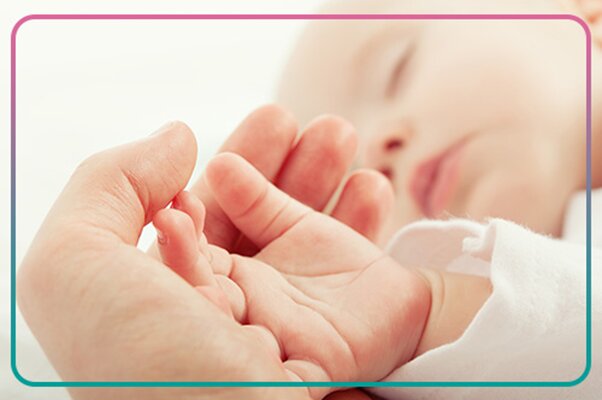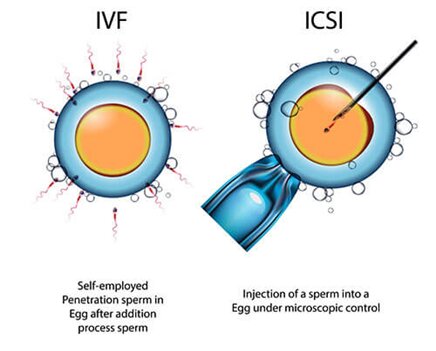Infertility Treatment Methods (IVF | ICSI | EGG
Donation)

Tehran (ISNA) - Normal pregnancy depends on various factors and conditions, in case of any disorder in any of them, the chance of fertility is decreased or even may go to zero. Infertility is one of the unwanted life phenomena that have been recently increased. A couple who couldn’t have a baby after a year of having sex without contraception, they are considered as infertile. All things needed couples know about fertility treatment is described in this post.
Infertility and its affecting factors
A couple is considered infertile if they cannot become pregnant after 12 months of unprotected intercourse. For women over the age of 35, infertility means not having fertility after 6 months of unprotected sex. Various causes can lead to infertility in couples. In general, these factors can be summarized in female and male factors.
Female-infertility factors include abnormalities in the female reproductive system or poor egg quality that impairs fertility.
Male-Infertility Cause is one-third of couples’ infertility causes. These types of infertility indicate the presence of dysfunction in sperm production or ejaculation in the male.
Research shows that in a third of cases, a combination of female and male factors causes infertility in couples. About 10% of couples also suffer from unknown causes of infertility.
Different methods of fertility treatment
There are different methods of infertility treatment like IVF, ICSI, IUI, and Egg Donation which can help infertile couples and give them a chance to have a baby. Iran is one of the leading countries in the region and in the world in the field of infertility treatment, therefore many couples choose fertility treatment in Iran for infertility treatment.
Several advanced research institutes and hospitals, provide infertility treatment services like IVF in Iran to both local and international patients. Moreover, other fertility services such as Gender Selection are offered in these centers as well for people who choose fertility treatment in Iran.
In the following, some of the most important methods of infertility treatment are introduced.
What is IVF?
In Vitro Fertilization (IVF) is one of the assisted reproductive techniques (ART) in which a man’s sperm and the woman’s egg are combined in a laboratory dish, where fertilization occurs. When the egg is fertilized, the primary cell begins to divide and form the embryo. The resulting embryo or embryos is/are then transferred to the woman’s uterus to implant and develop naturally.
How is IVF done?
IVF is a common procedure, used to overcome a range of fertility issues. It is a multi-step process involving ovulation induction, egg retrieval, Collection and preparation of sperm, fertilization, culture, and embryo transfer. The IVF process can be explained in these five steps:
• Ovulation induction
The greater the number of oocytes prepared during a treatment cycle, the greater the chance of a healthy fetus forming and subsequently the chance of pregnancy. A doctor prescribes ovulation induction drugs to stimulate the growth of several oocytes in a woman’s cycle.

• Ovum Pick up:
During a minor surgery, the infertile doctor picks up the mature oocytes using a special needle. This is done under conditions of local or general anesthesia. The procedure usually takes less than 30 minutes.
• Collection and preparation of sperm
In vitro fertilization of the oocyte with sperm requires the collection of semen. If the male is unable to produce semen, TESE or PESA methods are used to collect sperm.
The collected sperms are washed by a specific method and examined for motility and shape. Finally, high-quality sperms are selected to fertilize the oocytes.
• Fertilization and embryo culture:
After the ovum picks up, the embryologist examines the obtained egg to select mature eggs that are suitable for fertilization.
The mature eggs are placed in a culture medium and the sperm is transferred to an incubator for fertilization. In IVF, high-motility sperms move to the eggs and fertilize them. Once this occurs, the fertilized eggs are considered embryos.
In conditions with a low number and low quality of sperm, the specialist uses intracytoplasmic sperm injection (ICSI). It is an additional part of an IVF treatment cycle in which a single sperm is injected into each egg to assist fertilization.
• Embryo Transfer
Finally, the selected embryos are prepared for transfer to the uterus. A specialist physician inserts the embryo into the mother’s uterus during a minor surgery without the need for anesthesia.
What is the difference between ICSI and IVF?
The difference between IVF and ICSI is in how the oocyte is fertilized. In IVF, the oocyte is exposed to sperm in an in -vitro container until the highly motile sperm enters the oocyte and fertilizes it. But in the ICSI technique, a selected sperm is injected directly into the oocyte through a special needle. In this method, high-quality and motile sperm are separated and ready for injection in a laboratory using a special method. The ICSI method is mostly used in cases where the quality of male sperm is low.

Egg donation
Infertility is not always cured by prescribing medication or using advanced methods of infertility treatment. In cases where a woman’s ovarian reserves are low or the quality of eggs is low, but the uterus and other reproductive organs are healthy, the only fertility way is to receive an egg donated by a volunteer. For a consult of our doctors and specialists and to use the service of Egg Donation in Iran, you can contact us through the HayatMedTour website.
Fertility treatment in Iran
With over 30 years of experience in infertility research and treatment, Iran is one of the world’s pioneers in effective infertility treatment. There are more than 80 specialized fertility treatment centers in Tehran, Urmia, Yazd, Isfahan, and other cities of Iran. These clinics with the up-date of knowledge and equipment in the world; offer various methods for infertility treatments with the best quality and reasonable prices.
The high quality and affordable cost of fertility treatments in Iran have led many medical tourists to choose this destination for the treatment of their infertility problems.
End Item
No comments:
Post a Comment